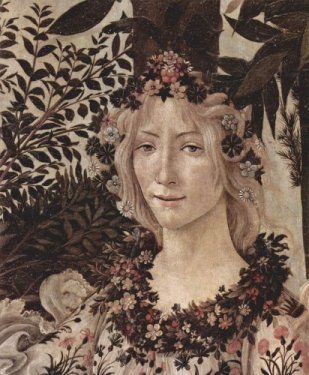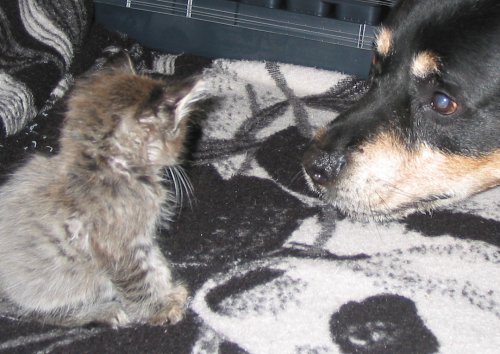May 15, 2009
flitting from flower to flower, exulting in the color, shape, and scent of spring. Each one is more beautiful than the last. I needed to worship someone for making flowers, so I looked up Flora, the Roman goddess of flowers, and found some amazing artwork to worship as well. (Uh-oh — she’s worshiping graven images!)

From Botticelli to Rembrandt, many people before me have felt driven to seek out a higher power responsible for flowers, and to give thanks. Rembrandt painted his Floras as plump women who appear pregnant. Others have painted her with one bare breast. Always she’s surrounded by or bedecked with flowers.
Botticelli’s Flora (above) looks a bit gaunt to me, and worried. Does she fear Mellona will be late sending the bees this year? (Mellona was the Romans’ name for the protector of bees.) Flora needn’t worry if she’s in my neighborhood. The bees are out in force, ecstatically worshiping flowers all over the place.

Note: The photo of the bee is by Jon Sullivan and made available by him to the public domain via PD Photo.org. Thank you, Jon! Thanks to Wikipedia, too.
— Barbara @ 6:47 pm PST, 05/15/09
February 24, 2009
It’s a hazy, cloudy day here today, so I don’t hold out much hope, but in some places tonight will be the best night to see the comet Lulin:
Green Comet Approaches Earth
Comet Lulin making nearest approach toward earth, one-time only
— Barbara @ 2:56 pm PST, 02/24/09
February 6, 2009
It doesn’t seem possible that we can already be one month and six days into 2009. I’ve been posting so infrequently that the blog barely has a pulse. But it is alive I assure you. It’s just been sleeping, dreaming if you will.
It’s raining and stormy today and I’m grateful for that. I think this is only our fourth big rain of the season so far. My cat Tara had a bath a few days ago on a warm, sunny, dry day that got to 80 degrees and seems to have become typical weather this winter. At least it’s been easy on the heating bill. Not so easy on the water bill or my sinuses.
I’ve been away from blogs except to post my ramblings about Tarot at Spirit Blooms. I’ve worked off-line at my other computer on artwork, read or posted on a couple of favorite Internet forums (more than I should), and searched out alternatives on- and off-line to spending money that I don’t have on books that I dearly want. I started out reading about Carl Gustav Jung; now I’m reading the writings of Jung himself, beginning with his autobiography written late in life, Memories, Dreams, Reflections . Still deep in my J. R. R. Tolkien adventure, I recently finished reading The Annotated Hobbit, and now I’m savoring The Lord of the Rings. I’m a little shocked by how much watching the movies in the interim has botched my memory of the original story. Still they’re excellent movies. One should appreciate each on its own merits, the novel and the movies as separate creative entities. To do the written story complete justice there would’ve had to be nine or more movies instead of three. Not that I would complain, but not everyone is the Tolkien fiend that I am. Up ahead I plan to continue with The Silmarillion
. Still deep in my J. R. R. Tolkien adventure, I recently finished reading The Annotated Hobbit, and now I’m savoring The Lord of the Rings. I’m a little shocked by how much watching the movies in the interim has botched my memory of the original story. Still they’re excellent movies. One should appreciate each on its own merits, the novel and the movies as separate creative entities. To do the written story complete justice there would’ve had to be nine or more movies instead of three. Not that I would complain, but not everyone is the Tolkien fiend that I am. Up ahead I plan to continue with The Silmarillion and The Children of Hurin. Perhaps others, who knows? I’m taking my time, reading mostly late in the evening before sleep, if I’m not too tired by then.
and The Children of Hurin. Perhaps others, who knows? I’m taking my time, reading mostly late in the evening before sleep, if I’m not too tired by then.
Eric Mayer mentioned, in his comment on my earlier post about rereading favorites, that he almost never rereads books. I’ve been the same way most of my adult life. I reread a lot when I was a teen and young adult, but at some point I realized there was plenty in print to read the first time around, and life was short. I felt that I’d miss out on too many other things if I spent my time rereading favorites.
I’ve changed my attitude about that again only recently. This has to do partly with some of the newer fiction that I’ve been dissatisfied with, partly with my budget, and partly with the tiny library here in town where the tastes of the librarians don’t seem to mesh with my own — or I’m just quirky in my reading tastes. I’m sure they have some Tolkien and maybe some Jung, but I’ve come to prefer to take my time and not feel constrained by a return date anyway. I tried writing reviews here for a while, and I found that if the book was a library book I had to return it too quickly, and if I tried to write a review after that, I kept wanting to refer to the book. If I like it, I want it to stay around for a while. I also tried our library’s on-line interconnection with an ebook download system, but that didn’t work for me. Old computer or aging human brain inside user? Either way it didn’t work and I didn’t want to waste time fussing with it. I wanted to read the book. You know, just open a cover and start reading. If something is going to slow me down I want it to be the savor of words.
That brings me to the fourth reason I’ve gotten back into rereading. Mostly it has to do with wanting to read slowly. I’ve given up on reading everything out there. I’ve finally accepted that’s impossible. I’ve decided to hone down my reading list and read what I love — slowly, and as many times as I want.
When I reread an old favorite I don’t have to be in such a hurry to get to the end. I already know how it ends. There is something to the first bloom of a new story, that first time through when it’s a path of discovery, recognition, and suspense. But this time I can pause and enjoy the language along the way, let the suspense build again slowly. My old favorites have language worth pausing for. The more commercial books today tend to be heavy on suspense and bizarre plots and twists, while they seem too often short on the kind of writing I savor. Many feel to me as if they’re written in too much of a hurry, or as if the writer didn’t even like the story he was writing. The secret to great writing, I think, is for the writer to so love the story that he’s reluctant to leave it. Chances are the reader won’t want to leave it either.
But then I’m not a hurrier, never have been. I think it’s too easy to get into an “I’ll miss something if I slow down” mindset in our day and age, though it’s a valid concern to some degree. In the work world, one must hurry enough to show up when needed, and if one slows down one is in danger of not getting important work done, of missing opportunities, or of not being able to do one’s job anymore because one hasn’t kept up with hyperactive technology. There are sometimes valid reasons to hurry. I don’t want the emergency room team to dawdle, or firefighters to take their time arriving at a fire. For readers who want to keep up, there’s such a huge amount being published, in spite of aspiring writers’ concerns that no one is publishing what they write, that it’s easy to think one has no time to reread or to read slowly the first time. There are also such a great number of people who want to be writers that it doesn’t appear we’ll ever have a shortage of reading material, even very good reading material leaving out the bad. It’s a crowded world full of people with something to say, many of them excellent writers.
Still I think we miss out on too much by trying to do or read everything. I’m not well-read, mainly because I’m a slow reader. Maybe that’s why I appreciate books that take a long time to produce. I can sense the love and time that was put into them. I can linger, relish, and wonder why. I can spend a relatively equal time enjoying them, and feel gratitude that the authors took the time to do it right.
Tolkien took something like 13 years to write The Lord of the Rings between 1937 and 1949. He took longer, when one considers all the thought prior to beginning it that he put into creating the world of Middle-Earth, from the time he was a boy, and the time between 1949 and 1954 that he worked with his publisher to get everything just right. That time shows. And it’s not as if by taking that long he missed out on sales, which seem these days so unforgiving of anyone lagging behind. The only time any of his books went out of print was during Word War II and the after-war years, when paper was rationed in England. Oh, and there was the problem of some proofs being destroyed in a bombing or a fire (I don’t remember which) that caused further delay in getting one edition of The Hobbit back into print. Of course one important factor in his print longevity was in being Tolkien. There have been many imitators and, as Eric seemed to hint in his comment, most imitations have not held up very well. Time is, I think, one reason.
I’m certain that the biggest problems with many books is that they’re devised and written in too much of a hurry, and because they aren’t true to the writer’s own creative promptings. I can see some publisher urging a writer to create something like Tolkien wrote, but to do it right now. Imitation done in a hurry can rarely hold up to the proper process of creation. Sometimes, but not usually. Imitation as a whole is an iffy and questionable practice. Readers may say they want another story like The Lord of the Rings, but they’re not saying they want an imitation. They want more Tolkien, and that’s simply the best possible compliment to the original creator, not to any would-be imitator. Perhaps we sometimes, as readers, make the mistake of confusing the two ideas ourselves and go looking for another Tolkien when we should be looking for something else that’s new and fresh, and over which someone labored long and lovingly.
It’s been said that most of a writer’s work doesn’t take place at the typewriter or keyboard, or even necessarily with paper in hand. It happens inside the mind of the writer. I personally think every writer’s workspace needs a comfy couch, or a bed, and a window with a view of a natural setting or garden, as well as an immense library. I also think it’s safe to say that most great fiction writers have lived what they write. By that I don’t mean they’ve experienced it in physical reality. I mean they have a fertile and active imagination, an ability to visualize the experiences they haven’t actually lived. A relentless imagination at that. We use our imaginations to read, but the writer uses his imagination far more, over and over again, actively reliving the scenes he writes in his mind, working them out until they feel right, until he’s ready to translate them into written language. They get to know their own unconscious realms and facets of their own characters, as well as the archetypes of the collective unconscious, even more than we do ordinarily when we dream at night.
Now I know that some writers create at the keyboard on the fly. I’ve done that too. But the stories I’ve written that I felt best about were usually those that I had in mind for a long time before I dared to put any words down. They were an integrated collection of many things that occurred to me, including some fantasies, day dreams, things I wondered about, and even whole scenes, characters, or settings that occupied my mind well before I realized they’d formed anything close to a story worth sharing or writing down. Some were ideas I couldn’t put away because they begged to be told.
Fast writing may be part of the problem. I once rewrote a novel (Snow Angels) in the course of a few weeks, retyped the whole thing from scratch, from my head. But that story had been in my mind for a long time, in various forms, and even on paper in a few forms, before I did that. I’ve never taken part in NaNoWriMo, but I think it is possible for it to produce something of value, provided there’s something already percolating in the writer’s mind before they begin, perhaps for years before they begin typing it out. I’ve done fast writing exercises, and I know they have their value. But I wonder if the trend in fast writing is the reason so many new books I read leave me flat these days.
There is fast writing that’s great, and there have been many great prolific writers. But if we make the mistake of thinking their greatness lay in their proliferation, we do them a disservice. The secret to great writing also doesn’t lie in taking forever to produce something. I’m sure there are plenty of slowly written pieces of rubbish passing for fiction. But prolific writers are the exceptions to the slow writing rule, I think, and like Mozart’s music, great fast writing is great for other reasons than its speed of production or lack of revision. Of course everyone should write at their own speed, but fast writing of a single draft usually requires slow thinking up front, and long, slow revisions afterward. If one doesn’t take the time to do it right, to follow through, to consider it worth some effort, then even that smaller portion of fast writing time is wasted, not to mention the time anyone else takes to read the result. If it’s not worth spending lots of time writing, then maybe it’s not worth reading either.
In spite of how long Tolkien’s work has remained in print, it’s still possible that work of this kind is best done for oneself, with any idea or intent of publishing as a mere afterthought. One should, after all, consider oneself worth writing well and respectfully for. From what I understand of Tolkien, he only shared what he created with a few colleagues, friends, and his children, until the friend of a friend mentioned the possibility of publishing The Hobbit. Maybe that’s why it’s so good. He took time to shape and polish it to be what he wanted for himself and those he loved. Only after that did he shape and polish it for publication. Surely that provided him a great deal of satisfaction in what he wrote, regardless of whether strangers in his own land or across the pond liked it later on. He was also a real-life expert regarding myths of a world similar to the one he created and regarding the language he used to create it. But was he an expert who happened to come up with a story he was best suited to write, or was he a writer in the making, even as a child, who lived in his head creating a world first and who worked all his life to become expert at just what he needed to recreate that world on paper? Either way, he took his loving time about it, and that’s a good thing for all of us. After all, what’s the rush?
— Barbara @ 1:55 pm PST, 02/06/09
September 13, 2008
Yesterday I killed the largest black widow spider I’ve ever seen. She was beautiful, but … she had to go.
Sorry to write such a Halloweenish blog so early. But the weather has been cool and cloudy here the past three days, making it possible for me to do a little gardening again, which makes me happy. I’m afraid in the hottest weeks of summer I don’t venture out much (or blog much, apparently), except to throw a little water on things to keep them from dying. Unfortunately weeds don’t seem to need much water to keep them from dying.
I don’t think I’ll ever be one of those people with a perfectly manicured and landscaped yard. But maybe this suits my personality better — you know, finding huge creepy spiders, growing a forest of weeds as prolifically as anything else, trying to figure out what to do with monster sized zucchini after zucchini, wishing a certain gopher would move elsewhere and that the neighborhood outdoor cats would stop killing my lizards and pooping in my flower bed. Story of my life. But it makes for more drama, perhaps, than a perfect yard.
Tara is growing up fast. She got spayed last week, which set her play time back some, a setback which had to be forced on her because she can’t seem to sit still for more than five minutes. People are such wusses after surgery, compared to pets. It makes one wonder why we’re the dominant species on the planet.
Now Tara’s making up for lost time!
My thoughts and prayers go out to those in Texas, where Hurricane Ike seems to be acting up much worse than my little terror of a kitten could dream of doing. I hope Ike doesn’t give her any fresh ideas.
— Barbara @ 10:38 am PST, 09/13/08
May 17, 2008
I’ve always been a cat person, and my spouse converted soon after we got together. Our dog is a cat person too, since he grew up with cats. Ever since Emily died in August, Indi has been lonely and bored. He started acting like a very old dog. We’re apparently boring, depressing people for a dog to own unless he has a cat around to spice things up, and he’d known and loved Emily all his life. Well, things got spiced up again yesterday, but good.
Meet Tara, named for the Goddess Tara, revered in Tibetan Buddhism as well as in Celtic lore. Cats are supposed to be worshiped, right? Tara thinks so.


In the second photo she’s making friends. Any time she ventures near her new doggy friend she receives a great big juicy kiss on the face, which of course any cat should be delighted to receive. Especially if she just finished washing the last kiss off her face. Indi also loves to get swatted in the face. I think Emily taught him to see that as fun, as a former owner had Emily de-clawed. Indi realized earlier today that Tara comes fully loaded, though she only swats when she’s playing.
We were a little concerned about the introduction, since lately Indi’s become enthusiastic about chasing strange cats out of his back yard. But when his new kitten was introduced as a member of the pack, he happily reverted to baby sitter. Tara took to him with no hissing, having been born into a home with dogs. She knows the drill. Avoid doggy kisses by cruising behind furniture and darting under beds. Especially after the doggy has just taken a long drink of water. (Very drippy business.) Indi is getting old, which you can tell by all that white fur on his face where it used to be mahogany. But having a kitten around has put a smile on all our faces and zest in our steps. (Handy when there’s a kitten darting about underfoot.)
— Barbara @ 4:42 pm PST, 05/17/08
March 9, 2008
A few days ago the New York Times ran a story headlined Gang Memoir, Turning Page, Is Pure Fiction, about Margaret Seltzer, alias Margaret B. Jones, and her memoir that wasn’t a memoir at all. She has admitted it was fiction. Today Alternet reports on yet another memoir writer who lied, in Literary Frauds Strike Again … and Again.
So, let’s see if I understand this. We’re supposed to sell our fiction as memoir now? Is that what I’ve been doing wrong? Is this what they mean by creative nonfiction? I’m confused.
I guess the little hand slap mainstream media gave James Frey, not to mention his second book contract, weren’t very good deterrents to the hot new trend in books — memoir fraud.
Readers expect a memoir to be true, if from a limited perspective of the writer’s personal experience and memory of events, which can of course be slightly skewed. We don’t all remember events that happened when we were growing up the same way our siblings or parents remember them. Obviously a lot of other nonfiction is opinion, or facts mingled with theories, presented from a single biased viewpoint. But a memoir isn’t supposed to be deliberately made up and then presented as the author’s own story. That’s called fiction.
These so-called memoir authors sold what they wrote as their own life stories, when they knew the stories either weren’t true or weren’t their experiences. They could’ve called their stories novels, or fictionalized accounts, but they didn’t. They called them memoirs. Some of them (Frey, at least) made a lot of money.
I don’t know about you, but when I spend hard-earned money on a book, my expectations are still pretty high. Those expectations are being fulfilled by books less and less often these days. I’m starting to think it’s no wonder people are reading fewer books, and I think the problem boils down to simple greed.
We all need to make a living. But most of us try to work hard and put in an honest effort at something for our living. We don’t resort to cheating, theft, fraud, and sloppy ethics. So who’s to blame here? Are these people just laughing at all us dummies who bother to actually be honest about our work? Laughing all the way to the bank?
The LA Times has published another opinion on why this type of thing happens in Why we fall for the fakes, an editorial that blames not just the writers, but the publishers, and finally the readers who keep purchasing these books.
What do readers think about this? If you pick up a memoir to read, do you want to know the person is at least attempting to be honest and accurate? Do you want to believe the publisher did their part in making sure they weren’t helping to perpetrate a fraud, or even instigating it? Do you think the writer is making a promise he or she is responsible to keep? Or when you pick up a memoir do you expect a certain amount of fiction?
What do you consider getting your money’s worth from a book? What are your expectations of authors and publishers as far as honesty? Are consumers partly to blame when we keep buying and don’t demand quality and integrity from the companies selling us products? Are we the readers to blame for books that fall below standards in either quality or integrity? Are we voting with our dollar for dishonesty? Or is that just an easy excuse for those who knowingly sell us shoddy or misrepresented products? Isn’t that blaming the victims, something like the purse snatcher saying, “Well she was just walking along the sidewalk. What was she doing there if she didn’t want it stolen?”
Perhaps most important of all, how does this make you feel about telling young people they should read more books?
— Barbara @ 11:40 am PST, 03/09/08
January 16, 2008
In a couple of weeks, groundhogs will make their yearly predictions, though I’m not sure a prairie dweller afraid of its own shadow is a very reliable sign of the turning seasons. I’ve begun to wonder if we’ll have an early spring, though. The weather has turned sunny and warm, and we haven’t needed an extra blanket for the past few nights.
Weeds have cropped up all over our yard, making everything green, even if it isn’t the commonly acceptable form of green. When the weeds first sprouted they were beautiful, and in some open, flat parts of the yard, from a distance you would almost think we had a lawn. We don’t, and now that they’re larger, from a distance they just look like a bunch of weeds.
We found something new and interesting under the pine trees. It was a strange vine, not anything I recognized, but vaguely reminiscent of a Cucumber, or maybe some variety of Passionflower. (Click photos for larger views.)


It had grown a lot by the time we noticed it, and was on its way to spreading all over that section of the yard, sending out long, tightly curled tendrils that took hold of whatever was in their reach.


It had already started up one pine tree.

I looked it up on the internet and didn’t find anything conclusive, at least not at first. Nope, not a garden-variety Cucumber, and thank goodness it doesn’t appear to be a Kudzu Vine. It wasn’t a Mandrake, which sort of disappointed me, as a fan of Harry Potter movies, though I don’t particularly want a plant that will scream at me.
Possibilities came and went as I searched for vines with multiple-lobed leaves, even the possibility that it was some kind of wild grape, which it wasn’t. One type of vine that seemed to come close was the Bitter Melon, also known as Balsam Apple or Balsam Pear. That narrowed my search to various forms of gourd or Cucurbitaceae, such as Hodgsonia, or Luffa, or the much more likely Chayote, which is sold in our local markets. But the leaves weren’t right for Chayote. The strongest possibility I’ve come up with so far is some variety of Coyote Melon or Coyote Gourd, which grows wild in our region.
If you know for certain what this vine is, please let me know.
How it got there is the easy part of this mystery, and would be even if I’d never seen a house finch scatter seeds. Our local scrub jay friends are always hiding things in the needles that collect under our pine trees. It’s a favorite place to store their seeds, nuts, magic beans, and whatever else they hoard for later, usually scrub oak acorns, or peanuts people have fed them. Last summer, while we trimmed the pine trees and cleared out a thick mulch of pine needles, one scrub jay kept fussing over our activity, and every now and then he darted in to rescue some of his treasures. In some years we’ve had volunteer sunflowers sprout there and grow to full height.
NOTE: The pictures that follow are from past summers, not this winter. Even here, we don’t ever see sunflowers blooming in January.


Out front, we have an entire patch of some kind of creeping yellow daisy that came up there one year, probably also carried in by birds. We water it now and then, so although it dies back each winter, it returns to open a bright patch of yellow flowers every summer, next to our old pickup.


In any case, the strange vine has been eradicated, so we won’t have any cries of “Feed me, Seymour!” coming from under the pine trees, and it won’t grow so large as to strangle a pine tree. Jack won’t have to climb up the beanstalk and see if there’s a giant living up there. Good thing, too, because no one named Jack lives here, so we’d have to pay Jack to do that. Still, I hope we didn’t kill something we would’ve liked. Sometimes the birds bring us weeds, and sometimes they bring us gifts that we enjoy for years.
Maybe we will have an early spring, maybe not. I’m in no hurry. I certainly don’t look forward to the hottest part of summer. But a long spring would be nice.
— Barbara @ 6:20 pm PST, 01/16/08
January 1, 2008
Happy New Year!
Today entered with a beautiful sunrise and left with a gorgeous sunset. What more could we want for the first of the year?
I’ve come to think that the day I enter a new year should be almost like any other day, that making resolutions for the entire year ahead isn’t really sensible. Anything can happen in the course of 12 months, and sometimes our focus changes completely due to forces outside our control. So instead of thinking about resolutions, I spent a lot of time in the past few days reviewing not only this past year, but my entire adult life. The whole-life review has partly to do with a journal project, basically sorting through a mass of accumulated pages from years of personal journal keeping and coming up with a way to edit them down to their essence and organize them, to preserve the memories without all the bulk. In the process I’ve read back through pages that I wrote at 18, 19, and 20 years of age. Wow, what a kid I was — and still am, in some ways. But it made me think a lot about choices and where they lead us, and how we define happiness and success at different times in our lives, especially how our focus shifts, sometimes suddenly, and what we spend our thoughts on. It made me face some of my regrets that I hadn’t considered or thought about in years.
Those regrets include hurting people’s feelings in any way — and I’ve committed some doozies, usually by accident but in hurtful, unthinking ways just the same. I regret changing my college major from English, leaving college without a degree, spending too much time in college distracted by and pining over young men, imagining potential relationships where it should’ve been obvious to me they didn’t exist, joining a church at 19, which distracted me even more from school and may have been what finally drew me away from it altogether — there were boys there (gag me with another repetitive, pining journal page) — and taking religion too seriously for even those few years, mistaking it for a deeper form of spirituality that it was not. Let me say right here, young women put far too much emphasis, or at least we did back then, on finding mates. It’s absurd. Though I eventually did, and have been with him for going on 25 years now, he wasn’t one of those responsible for distracting me in school, so you see all that pining back then was a complete waste. Later in life, I regret not buying a house sooner (though I’m not sure how that would’ve been possible earlier), not taking more vacations when I could afford them, buying even half of the magazines I ever purchased, spending rather than saving most of the excess I finally earned for a few years (and still not spending it on vacations), not buying a new car before I retired, and not giving up on being a novelist sooner. I’m serious about that — seven novels with no sale is too much — enough already!
In spite of those regrets, I’m pretty happy with most of my choices, especially in my spouse, and even in some of the jobs I didn’t like at the time but which were worth the opportunities and the friends they brought me. In fact all my experiences, including many I regret, taught me something of value.
Regrets are a waste too, so I won’t dwell on them, or on dreams or plans for the future. Instead I want to focus on now, on how I’m doing and what I plan in just the next few days or weeks. If there’s anything else I need to focus on more of the time, at this point in my life, it’s the same things I think we should always focus on, all our lives. Most of the people I know spend too much worry on whether we’re good enough, or what we’d change about the past. And some of us spend too much time worrying what others should do, or what should happen that’s out of our control, to make us happy. So I’m reminding myself yet again:
Be happy with myself, as I am
Don’t worry whether others like or approve of me
Treat myself and others kindly and with respect
Don’t let anyone tell me how I should live my life, and don’t tell anyone how to live theirs, as long as they’re not harming anyone
Stand up for myself and for the rights of others
Love life, and live it with passion and an open mind to possible outcomes
Have no regrets — let them go
Follow my bliss and enjoy seeing others follow theirs
Own my life
Don’t worry at all, let tomorrow take care of itself
Learn from everything
All my best regards to you for 2008, and good luck in the coming year.
— Barbara @ 6:43 pm PST, 01/01/08
October 9, 2007
I’m in one of those quiet times when I think about things to write, and sometimes even write them, but I don’t post. So the blog is quiet. This is not an apology. I’ve decided that irregular blogging doesn’t require apology. It usually means we’re living more outside the blog or the Internet, and that is often for the best.
We’re getting our typical early fall weather, which isn’t really fall at all, but an evaporated extension of summer. A few cool, rainy days fooled us into thinking this autumn might turn out otherwise, but not so. Now we’re getting the really dry weather that saps the moisture out of every living thing, including me. My skin doesn’t like it, my hair doesn’t like it, and neither does the rest of me. Every contact with a metal object results in a little blue spark, making me cautious and twitchy. Maybe that caution extends to writing and is what keeps me from posting.
This is the time of year that I envy those who live where fall turns spectacular colors. Here we get drab yellowing, and maybe a little dull orange if the leaves don’t dry up and blow away in a Santa Ana wind before they have a chance to turn. I love fall colors, so I gravitate toward pictures of true autumn, and I’m grateful to all the bloggers in other places who share their photos of fall. Fall is my favorite season, and I crave as much as I can get.
— Barbara @ 2:02 pm PST, 10/09/07
September 20, 2007
Bruce at Wordswimmer writes about story endings in his post, Where the River Ends, and that got me to thinking about some of the problems I’ve encountered in ending mysteries.
With a mystery, the question of how to end the story begins with which character did the crime. I no longer start with a specific villain in mind. The story often changes so much in the writing that a pre-planned ending has no choice but to change as well, or it wouldn’t make much sense.
In the last couple of mysteries I’ve written, I was as surprised as anyone by who the villain turned out to be once I got to the second draft or later. That’s okay, and it has a lot to do with how I develop characters. If I know who the villain is too early, I’m in danger of giving it away, offering hints I’m not even aware of because of my judgments about that character.
If I start out thinking the villain isn’t a villain, I can get to the heart of that character sooner in my own mind. I can get to know him, let him grow and round out on the page. I’m an idealist, and I really like to see the best in people, so there needs to be that spark of sympathy first, without letting on even to myself that he or she is a killer in the making. I guess in that regard my characterization is as organic as raising a child. What mother imagines her infant would harm anyone?
This process forces me to explore the shadows, my characters’ shadows as well as my own, to see possible motivations, both conscious and unconscious.
I first encountered the shadow, as a human concept, in stories I read. I confess that I didn’t understand the concept very well when I was young and still in denial that I had a shadow or that any good person did. But one encounters this idea many times, if one reads at all widely, and the reason for that is it’s a universal truth about human nature.
In exploring the shadows, I’ve come to see that a fully rounded character, even if he’s the good guy, has a shadow, whether that shadow is clear on the page or not, whether that shadow is negative or positive. I want to know each major character’s background as well as possible, so I start with the positives and work my way into the negatives. Though it hurts me to watch a character I’ve come to like or sympathize with cross the line into murder, at least the biggest puzzle of the mystery isn’t lost on me, and I’m not giving the killer away up front. If I decide the murderer needs to be someone else, not the person I thought it was going to be, I don’t have to cast about too far for someone else who could have done it. In truth, any one of the characters might be capable of killing, given the right circumstances and motivation. They all have their shadows. By the time I get to my final draft, I usually have a few characters that, with nudges into poor choices and flawed rationalization, could become much darker individuals. That’s usually a key to how I end the story. Which character, which nudges, and which choices? Which fits this need best? What motivates the villain to do the awful deed and also causes him or her to get caught in the end? How will the reader be surprised and at the same time see that this person and the clues leading there were present all along? (Foreshadowing will have to wait for another post.)
My exploration of the shadows has made me think a lot about the choices we make in life, and how important each one is, especially when we stack one choice on top of another in the way that we sometimes come to think of as inevitable. We don’t have a choice in everything, certainly, but sometimes when we look back over our lives or a course of events, we can see the turnings we’ve made, and many of them were choices, that brought each of us to be who, where, and what we are today. When we’re accountable for those choices, I think we improve our ability to move forward and make better ones.
If there’s one positive effect fiction can have, perhaps it’s to get us to take a look at the cause and effect of choices. What are we capable of? What would we do in the same situation, and where might that take us or what might it make of us, and our world with us? The stories that get me to think in those terms are the stories that stay with me.
— Barbara @ 1:13 pm PST, 09/20/07

















